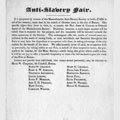| |
Introduction
Abolitionist women organized Anti-Slavery Fairs like the one advertised below to raise money to support their activism. The fairs combined the sale of donated items imported from Europe as well as handmade goods made by the women involved, thereby giving women's domestic work a political purpose. Some fairs raised money to sustain organizations, newspapers, or paid staff; others passed the money on to aid freed slaves. Like the petition campaigns, anti-slavery fairs also served a second purpose: to raise awareness of the abolitionist issue.
Questions to Consider
-
What does the document suggest about the skills women gained from participating in and organizing anti-slavery fairs?
-
Women used their own names on the advertisement, rather than identifying themselves as, for example, Mrs. Chapman. What might this say about their sense of public identity?
-
How did using their own names challenge accepted ideas about appropriate female behavior?
Document

(click to enlarge)
Anti-Slavery Fair.
It is proposed by the women of the Massachusetts Anti-Slavery Society to hold a FAIR in aid of the treasury, some time in the month of October next, in the city of Boston. One specific object they have in view, is, to sustain the Rev. John A. Collins as General Agent of the Massachusetts Society. Doubtless, however, a much larger amount will be raised than is required for this purpose, and the remainder will be devoted towards the other operations of the Society. The undersigned offer the results of several years experience in this mode of raising funds, to such individuals and Societies throughout the State as may have the disposition to co-operate with them, in taking advantage of the city market for the benefit of the slave. We affectionately invite all such, to co-operate with us personally, by taking tables at our Fair, in behalf of their respective towns, the proceeds to be THEIRS, for the Mass. Society — credit being thus given where credit is due. It will be our joy to offer a heartfelt hospitality to those who feel inclined to pass the week of the Fair in Boston.
Letters and parcels from individuals who cannot attend personally, may be directed to Maria W. Chapman, 25 Cornhill, Boston
Maria W. Chapman
Mary A. W. Johnson
Thankful Southwick
Louisa Loring
Eliza Merriam
Ann T. G. Phillips
Mary Young
Caroline Weston
Mary G. Chapman
Eliza Lee Follen
Henrietta Sargent
Susan Paul
Eliza Philbrick
Anne Weston
Helen E. Garrison [wife of William Lloyd Garrison]
Source:
Library of Congress, Rare Book and Special Collections Divisions (39).
Next >>>
<<< Return to Evidence
|